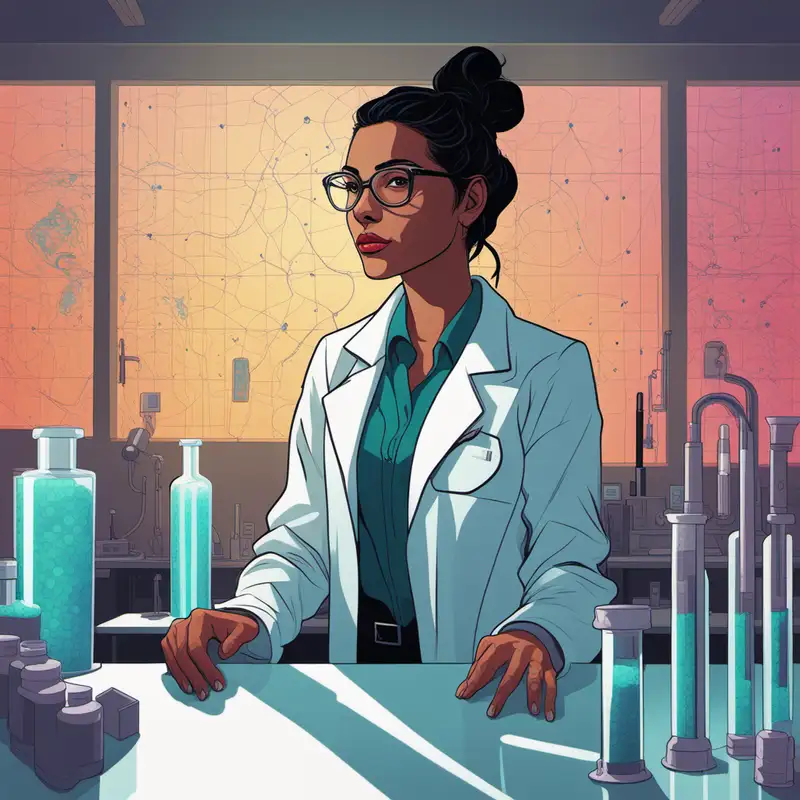
Dose of Disruption
Summary
When a breakthrough self-boosting vaccine ignites global hope—and fear—an MIT team must outwit sabotage and moral peril to prevent their invention from becoming a weapon of chaos.**Chapter 1: Firewall Breach**
Ana Jaksin's phone lit up with catastrophe at 3:17 AM, jolting her from a fitful sleep at her MIT office desk.
SECURITY BREACH - LEVEL 1 - ALL SYSTEMS
Her heart seized as she scanned the monitor. Firewalls crumbling, data hemorrhaging. Three years of research on self-boosting vaccines—her promise to prevent deaths like her mother's—exposed in minutes.
"Rhoda, we've been hacked. Get to the lab now."
Linzixuan "Rhoda" Zhan arrived breathless, her black bob disheveled, oversized MIT sweater thrown over pajamas.
"How bad?"
"They've accessed everything—research data, trial results, internal messages." Ana's hand found her mother's caduceus pendant, thumb tracing the worn silver snakes. "Even the microparticle formulation specs."
"Server logs show multiple entry points," Rhoda muttered, typing furiously. "This isn't standard corporate espionage. The attack pattern is... unlike anything I've seen."
Robert Lannard entered, silver hair uncombed but eyes alert despite the hour. Steam rose from his ever-present MIT mug as he studied the scrolling breach data.
"Perfect timing—right before the trials. Almost like they knew our schedule intimately."
"They did." Rhoda's voice turned sharp. "Look at this access pattern. They navigated our file structure like they had a map."
Ana's stomach twisted as she paced. Outside, Cambridge slept while her life's work unraveled. The Kenyan trial started in seven hours—three hundred children waiting for vaccines that could change their futures.
"If we delay—" she began.
"We lose credibility and funding," Robert finished.
"Too late." Rhoda swore. "It's hitting Twitter."
The screen showed their leaked Slack messages:
*@RZhan: Microparticles showing 12% failure rate in simultaneous release tests. Could trigger immune overresponse.*
*@AJaksin: Fix it before Lannard sees. We can't miss another deadline.*
Ana's chest tightened. That exchange from six months ago—when exhaustion had made her careless with words—now stripped of context and weaponized against them.
Her phone exploded: media vultures circling, partners demanding answers, the WHO ethics committee requesting an emergency briefing.
"Nairobi's drowning in 'MIT Experiments on African Children' headlines," Rhoda reported.
The Kenyan Health Minister's call came moments later. Ana switched to speaker mode, forcing steel into her voice despite the tremor in her hands.
"Minister Odera, I understand your concern. The leaked data is incomplete and outdated. That issue was resolved months ago, with safety margins well above requirements."
His response carried weighted silence. "Provide documentation. But understand—my priority is protecting Kenyan citizens, not your research timeline."
After the call ended, Rhoda's typing suddenly ceased. "Ana... there's something else. These intrusion patterns—they match a signature I've seen in reports. A group that's been hitting research facilities globally."
"Pharmaceutical companies?" Ana asked.
"Bigger. More sophisticated." Rhoda pulled up encrypted logs. "See these data fragments? They're tagged with markers I've only seen attributed to—" She hesitated. "A collective that some say doesn't exist."
Robert leaned closer, frowning. "And they're not just after our data." He pointed to anomalies in their tracking system. "They've compromised the vaccine supply chain. The digital breach was cover for physical tampering."
Ana's fingers clenched around her pendant until the edges bit into her palm. The memory of her mother's final days in a rural clinic surfaced—preventable suffering that had driven Ana's research for decades.
"Call Minister Odera back," she ordered. "We delay the trial—not because of leaked data, but because we can't verify vaccine integrity." She stared at the strange markers in their logs. "Someone powerful wants us stopped. But they don't understand what drives us."
As dawn painted MIT's buildings gold, Ana watched her team mobilize. This wasn't just about science anymore. Someone had made it personal—and she'd learned long ago that personal stakes made the most dangerous opponents.
---
**Chapter 2: Trial by Fire**
The heat pressed down on Ana as she stepped from the air-conditioned vehicle. Sweat beaded along her hairline while dust swirled around her ankles, kicked up by the convoy of white SUVs pulling into the makeshift compound.
"Welcome to ground zero," Robert muttered, shielding his eyes. "Not exactly the rollout we imagined."
Ana's throat tightened. After discovering the security breach three weeks ago, they'd implemented emergency protocols—new batch testing, enhanced encryption, round-the-clock surveillance. Minister Odera had refused their request to delay the trial, citing the region's urgent need amid a growing measles outbreak.
"We either proceed with caution or abandon these children entirely," he'd told her on their last video call. "Which burden can you live with, Dr. Jaksin?"
The weight of those words haunted her as she surveyed the sprawling tent city housing their field operation. Medical personnel darted between stations, their movements sharp with tension. Local officials huddled near the entrance, faces drawn. Beyond the perimeter fence, protesters waved hand-painted signs, their voices carrying across the dusty air.
"My son died from your Western medicine!" a woman shouted in Swahili. Ana understood enough to feel the raw pain in her voice.
Dr. Kiano approached, her usual confident stride betraying hints of worry. "The protests have grown since dawn. Someone leaked doctored photos showing children with severe reactions. My own staff are asking questions I can't answer."
"Those aren't from our trial," Ana said, her voice hollow.
"Obviously. But fear has deep roots here." Dr. Kiano's eyes softened. "When you've seen children die from bad medicine, trust becomes precious."
A black sedan pulled up to the gate. Men in expensive suits emerged, led by Victor Mercer from Novacorp, his silver hair catching the sun. Their largest competitor had publicly questioned their technology while trying to poach their team members.
Ana's phone buzzed. A message from Rhoda: *Strange readings in batch tracking. Need you in the lab.*
"Handle the vultures?" she asked Robert.
"Go. I speak fluent corporate shark."
In the portable clean room, Rhoda hunched over her laptop, tension visible in her shoulders. "These digital inconsistencies I flagged? They're not just data corruption." She pulled up microscopic images. "The microparticle shells show subtle alterations. Some would release too early, others not at all."
Cold spread through Ana's chest. "How many doses?"
"Without testing each container? Impossible to say."
Robert slipped in, his face tight. "They're demanding we start immediately. But there's more - overheard Mercer on a call. He seemed scared, said 'this isn't what we agreed to.'"
Through the window, Ana watched Minister Odera arrive amid a swarm of cameras. A young mother outside the fence clutched her child, fear and hope warring in her expression.
"If we delay, the project dies," Robert said quietly. "If we proceed..."
"We could hurt people," Rhoda finished.
Ana touched her mother's pendant, remembering her final days in a rural clinic. "Test what you can quickly. We'll start small, only with verified batches."
Outside, she found Mercer waiting. His practiced smile slipped when she met his gaze.
"Be careful, Ana," he murmured. "This goes beyond market share now. There are bigger players."
Her phone buzzed again. Anonymous: *The microparticles carry something else. Check molecular signatures.*
Rhoda's face went ashen at the message. "If someone reprogrammed the payloads..." She swallowed hard. "We wouldn't just be delivering ineffective vaccines."
Ana stared at the waiting crowds - desperate parents, worried doctors, calculating executives. Her mother's voice echoed in her memory: *Sometimes courage means walking away.*
"Lock it down," she ordered. "Every dose gets tested."
As she walked toward the microphones, Ana felt the weight of what was coming. But she'd learned long ago - some prices were too high, no matter who was watching.
---
**Chapter 3: Disclosure Cascade**
Ana gripped her mother's pendant, staring at her reflection in the community center's grimy bathroom mirror. In thirty minutes, she'd either save the vaccine project or destroy her career. Maybe both.
The makeshift press room hummed with voices beyond the door. Her phone buzzed again - another warning from the Ministry of Health: *Reconsider this broadcast. Legal consequences will follow unauthorized disclosures.*
She splashed cold water on her face and straightened her blazer. Her mother's voice echoed: *Truth costs, but lies cost more.*
The press room fell silent as she approached the podium. Camera lenses tracked her movement while Robert stood nearby, face etched with concern. Rhoda hunched over her tablet, analyzing the compromised vaccine data.
"You don't have to do this alone," Robert murmured. "We could issue a joint statement, buy time."
"No. They deserve to hear it from me."
The red light blinked on.
"Good evening. I'm Dr. Ana Jaksin, lead researcher on the MIT self-boosting vaccine initiative." She drew a steady breath. "Our team has discovered evidence of tampering with our vaccine supplies. Some doses contain altered compounds that could render them ineffective or harmful."
Gasps rippled through the room. Cameras flashed like lightning.
"We are immediately suspending all trials and recalling distributed doses for testing. While no recipients face immediate danger, we advise contacting our monitoring team."
Her tablet lit up - Rhoda's message: *Batch 17 shows foreign compounds. Not just inactive—potentially psychoactive.*
Ana's throat tightened. She looked directly into the main camera.
"This was not a manufacturing error. Evidence points to deliberate sabotage by the Proteus Collective, known for targeting biotechnology. We also believe certain pharmaceutical interests inadvertently enabled this attack through their campaign to discredit our work."
The room erupted. A health ministry official lurched forward but security blocked his path.
"Dr. Jaksin!" A reporter shot up. "Are you alleging corporate conspiracy with bioterrorists?"
"I'm saying when legitimate criticism becomes sabotage, it creates vulnerabilities others exploit. The distinction matters."
Her tablet flooded with messages - MIT demanding silence, legal threats, Robert's gentle squeeze on her shoulder urging caution.
"I take full responsibility for not detecting these breaches earlier. The promise of helping millions blinded me to the risks." She gripped the podium. "But I won't hide behind corporate speak. People trusted us with their health. That trust demands honesty, especially when things go wrong."
"What exactly is in these altered vaccines?" asked a TechWire reporter.
"Early analysis shows compounds that could affect neurological function. These are sophisticated alterations made by someone with access to our supply chain."
The health official muscled forward. "This unauthorized disclosure violates multiple agreements—"
"With respect, protocols don't supersede public safety. People's lives aren't contractual footnotes."
His face purpled. "You'll never work in this field again."
"If that's truth's price, I'll pay it."
An anonymous message flashed on her tablet: *Brave move, Doctor. But you've only found what we wanted you to find.*
Ice spread through her veins. She scanned the room, sensing hidden eyes.
"We're establishing an independent review board to investigate. Complete findings will be published regardless of implications."
Robert stepped up. "We're implementing emergency protocols for trial participants, with daily monitoring."
"Dr. Jaksin," a young reporter called, "do you regret creating this technology?"
The question pierced her armor. "I believe in this vaccine's potential to save millions. But I underestimated how vulnerable breakthroughs are - not just to technical failures, but to human ones. To greed and fear and the desire to control."
Her phone buzzed - MIT's president demanding contact.
"We'll rebuild with better safeguards and humbler expectations. But first, we face our mistakes."
The room dissolved into chaos. Ana stepped back, drained.
"You just torched your career," Robert said.
"I know."
"It was right."
Her phone lit up with another anonymous message: *Check the control group, Doctor. Not all placebos are created equal.*
She showed Robert and Rhoda, her skin prickling. "The real attack isn't what they revealed - it's what they're hiding."
Through the window, news vans gathered like carrion birds. Her career might end, but something else was beginning - a reckoning the scientific community could no longer avoid.
